To the candidate who wants to succeed in their McKinsey, BCG or Bain interviews:
How to master the most important case interview skill
(and become top 1% at it)
What if you could easily create customized structures for any case interview problem like a real MBB consultant would?
Reviews for our previous structuring course
Simply amazing
Lola Jiang
This is the best structuring course I've ever taken. I feel a lot more confident now than ever. I'm still redoing the drills to make sure I fully master it. ...
Read MoreThis is the best structuring course I've ever taken. I feel a lot more confident now than ever. I'm still redoing the drills to make sure I fully master it. Thank you so much for developing this course
Read LessGreat Course
Naphat Jantaranukul
I have utilized things that Bruno taught during the course as fundamental to my case interview skills landed me an offer in one of the top consulting firms!
I have utilized things that Bruno taught during the course as fundamental to my case interview skills landed me an offer in one of the top consulting firms!
Read LessTop class material, worth every penny!
Manisha Mathur
This course has really been beyond my expectations in terms of case quality, approach and explanations. I wouldn't have been able to learn so much on my own,...
Read MoreThis course has really been beyond my expectations in terms of case quality, approach and explanations. I wouldn't have been able to learn so much on my own, or just by doing cases with partners. Highly highly recommended for all case interview takers. So profound insights in each and every problem.
Read LessThis was just phenomenal
Tilen Visnjevec
Hands down the best resource I have ever studied from
Hands down the best resource I have ever studied from
Read LessI loved it!
Sang Han
It definitely gave me confidence that I can structure any case now. I'd like to go back and redo it especially initial ones to see how I have improved better.
It definitely gave me confidence that I can structure any case now. I'd like to go back and redo it especially initial ones to see how I have improved better.
Read LessAwesome material which took me to te next level
Lucas Costantino
Can totally recommend the drills, they were the missing puzzle piece to my preparation. And even apart from consulting prep the drills can be applied on the ...
Read MoreCan totally recommend the drills, they were the missing puzzle piece to my preparation. And even apart from consulting prep the drills can be applied on the job/ in other areas of life as well.
Read Lessvalue is much higher than the price
Yan Xu
exceptional contents! definitely bring me to another level!
exceptional contents! definitely bring me to another level!
Read LessGreat Course!!
Mara von Laar
Love this course! And all peers who practiced cases with me said that my structure and flexibility of adjusting my structure given new information is on poin...
Read MoreLove this course! And all peers who practiced cases with me said that my structure and flexibility of adjusting my structure given new information is on point! Would always recommend.
Read LessAmazing course
Peter Nielsen
Helped me incredibly in practicing structures. Went over multiple times
Helped me incredibly in practicing structures. Went over multiple times
Read LessStructuring is the 80/20 of case performance
Have you ever wondered how a REAL consultant would prepare for case interviews, knowing all they know?
Imagine overnight they lost their case solving skills (through some act of wizardry) but kept the knowledge about the recruiting process and their "consulting intuitions".
What would they do?
I'll tell you what they WOULDN'T do.
- They wouldn't spend hundreds of hours doing random mock-cases with other candidates.
- They wouldn't care about "learning frameworks" for "common case types" like Market Entry, Profitability and M&A.
- They certainly wouldn't look for "tips and tricks", nor would they spend WEEKS looking for silver bullets (like trying to build "one framework that I can use to start any case").
No.
Their "consulting intuition" would tell them that this is all just a big waste of time.
What they'd do is to spend most of their time mastering the ONE KEY SKILL that would take his case solving skills to the top 1%.
And the ONE KEY SKILL for case performance is obvious...
It's Structuring.
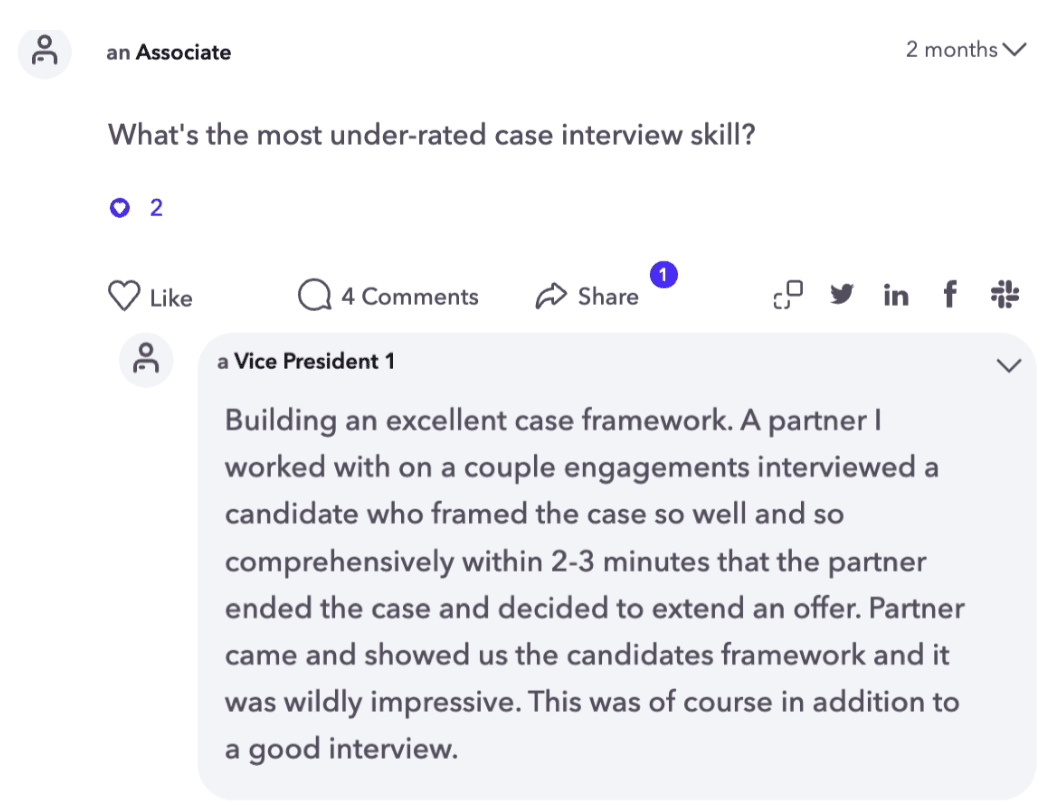
"Underrated" doesn't mean neglected. It means something people should focus MORE on, even if they already spend plenty of time on it.
Structuring is the work you do before doing all the work.
It defines your odds of success and your time efficiency when solving a problem.
It's how you stop getting stuck in your cases.
It's how you SHOW your interviewer, in the first 5 minutes of your case, that you WILL get to the answer within the 30 minutes you have.
Strong structuring skills give you the assurance that you WILL perform well even if you get a weird case you've never seen before.
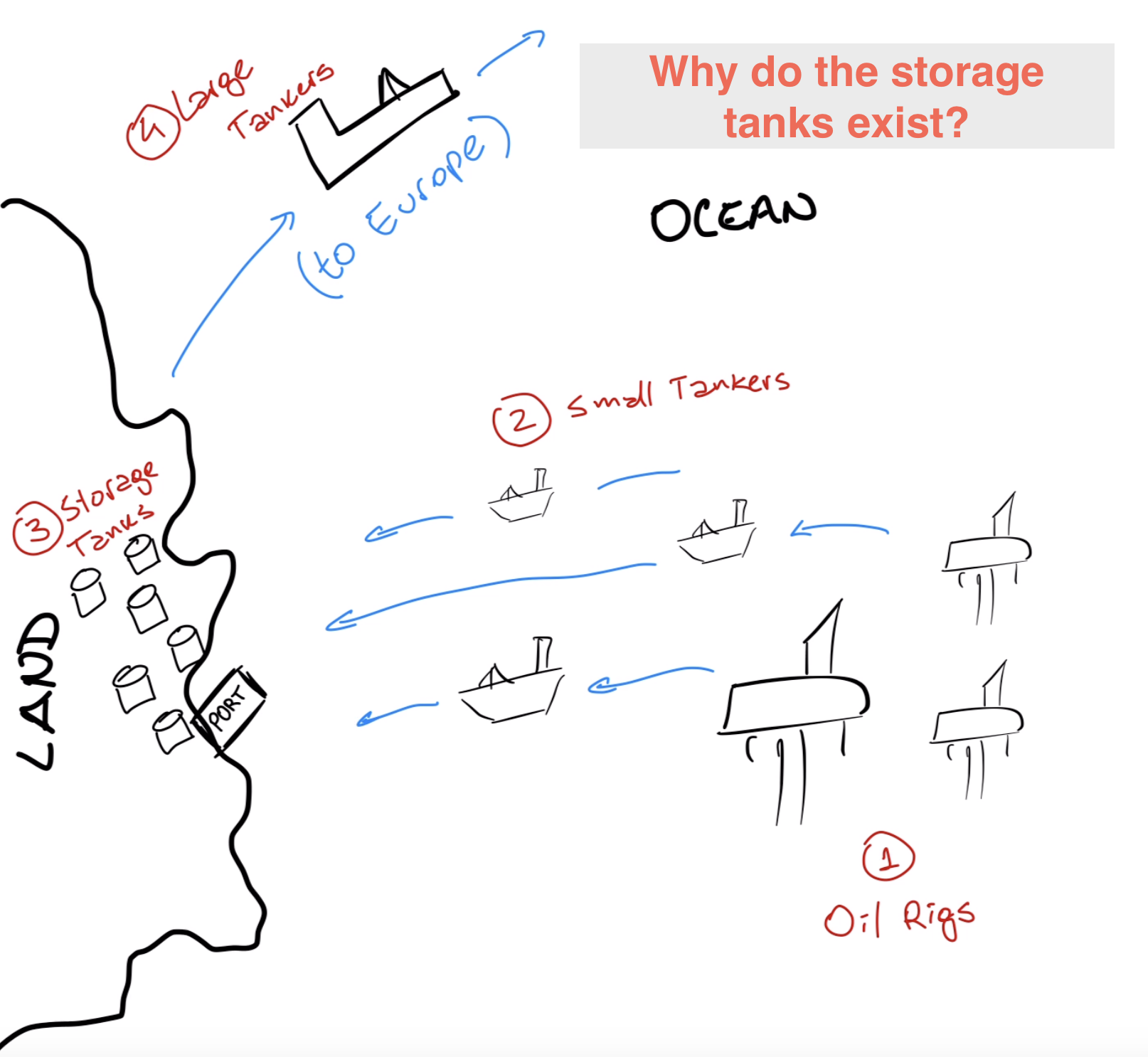
The weirdest case I even got was in a Bain 2nd round.
I bet you can't find a framework for this one...
If you're good at structuring, your interviewer will give you the benefit of the doubt.
About what, you ask?
About pretty much anything!
Missed an insight?
- "Haha, that's okay, you had many good ideas..."
Made a math mistake?
- "Oh, I also get nervous when doing math on the spot, no worries!"
They'll overlook all your weaknesses because you have the most valuable and hardest-to-find skill there is.
Structure poorly, though, and you'll have a doubtful interviewer that'll second guess everything you do. Every word you say.
Ask any real consultant what's the #1 skill you should master for your cases and they're all going to say the same thing:
"Structuring."

This experienced coach knows what he's talking about.
And yet, most people never really learn structuring
Yes, almost all candidates spend plenty of time on structures
But they never really learn structuring as a skill.
They never learn to structure problems from scratch.
Want proof?
Ask them to structure a weird, ambiguous problem.
Even better, ask them to structure a problem that's not really related to business at all.
They freeze.
They mumble and jumble a bunch of words.
They might even draw some cute boxes and write some questionable bullet points to have something that resembles a structure.
But it's gonna be nonsense.
It won't be MECE.
Or worse, it won't tackle the crux of the case.
It's just going to be a collection of words they hope might point them in the right direction.
And real consultants, who do this for a living, will see right through it.
Interviewers have a finely tuned BS detector. And they're looking for people who have the real skill.
There's a reason consulting firms have been using Public Sector cases and even "ecology cases" more recently.
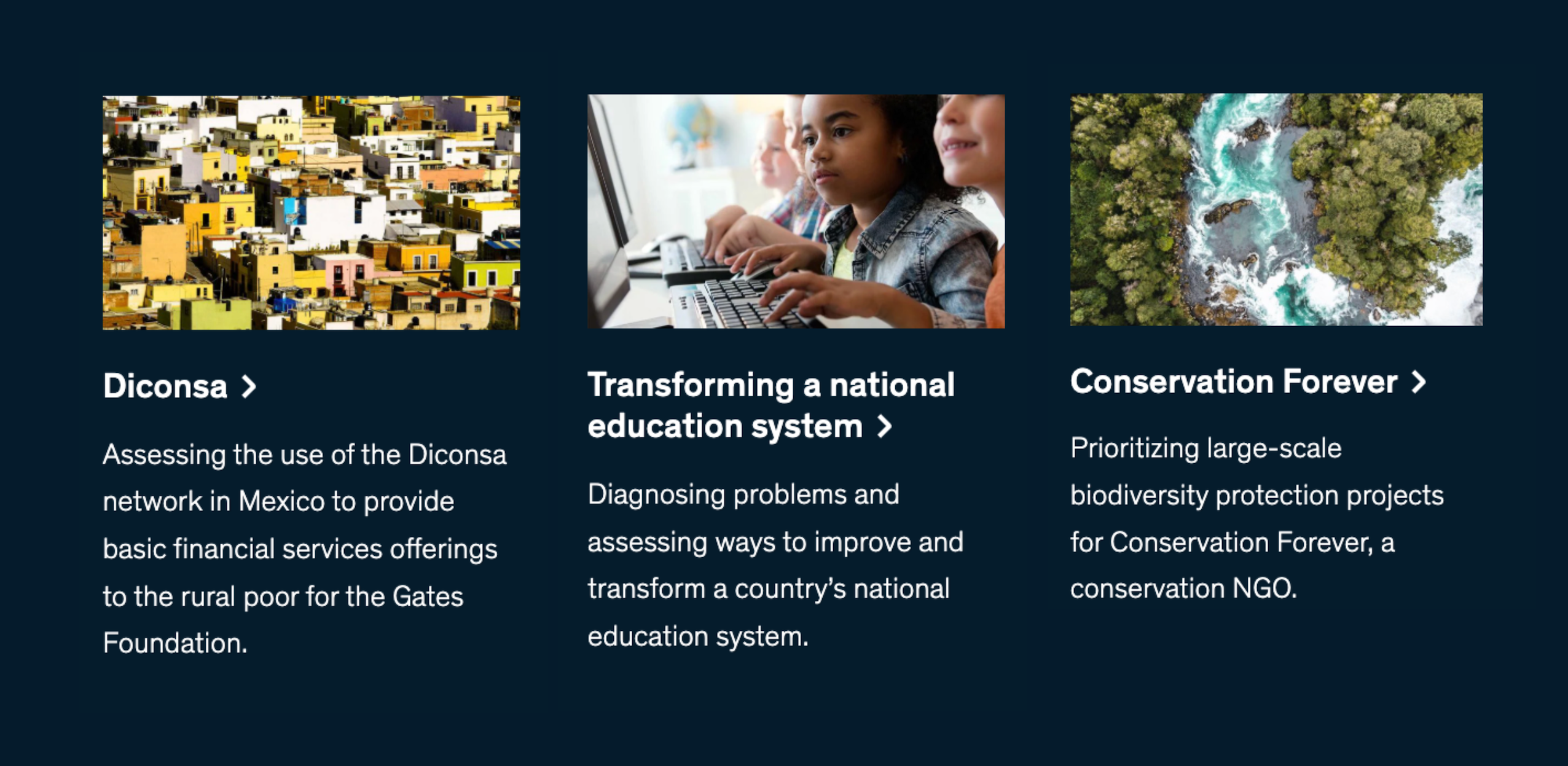 Half the example cases in McKinsey's website are non-business cases
Half the example cases in McKinsey's website are non-business cases
This wasn't common in the past.
Twenty years ago, almost all cases were business cases.
But with the rise of the case prep industry -- that LOVES teaching you frameworks you can "copy and paste" into your interviews -- they had no other choice.
They had to make their cases weirder and more ambiguous.
They do that because what they're looking for is not someone who can memorize and regurgitate frameworks.
They want to hire people who can solve the types of problems clients hire consulting firms for (paying MILLIONS OF DOLLARS in the process).
Consulting firms are looking for professionals who can see a new, unique problem and, in real time, often during a client meeting, create a specific MECE structure for that client's problem.
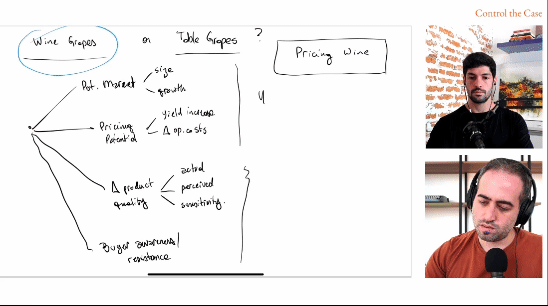 You must be able to think FAST when solving case problems -- as you do in real life
You must be able to think FAST when solving case problems -- as you do in real life
A structure that brings insight. A structure that everyone in the room can SEE will get the problem solved.
And this is the main thing they're testing for through several cases in their interview process.
But most candidates never learn it.
They just "learn" a mirage of the real thing.
What being good at structuring can do for you
Before I go into the weeds of how gurus and coaches pretend to teach you structuring, and how most candidates pretend to learn it, we need to talk about something...
We need to talk about how being great at the skill of structuring will COMPLETELY TRANSFORM both your case preparation and your performance when interview day comes.
It will do so in six big ways:
WAY #1: No more blanking out
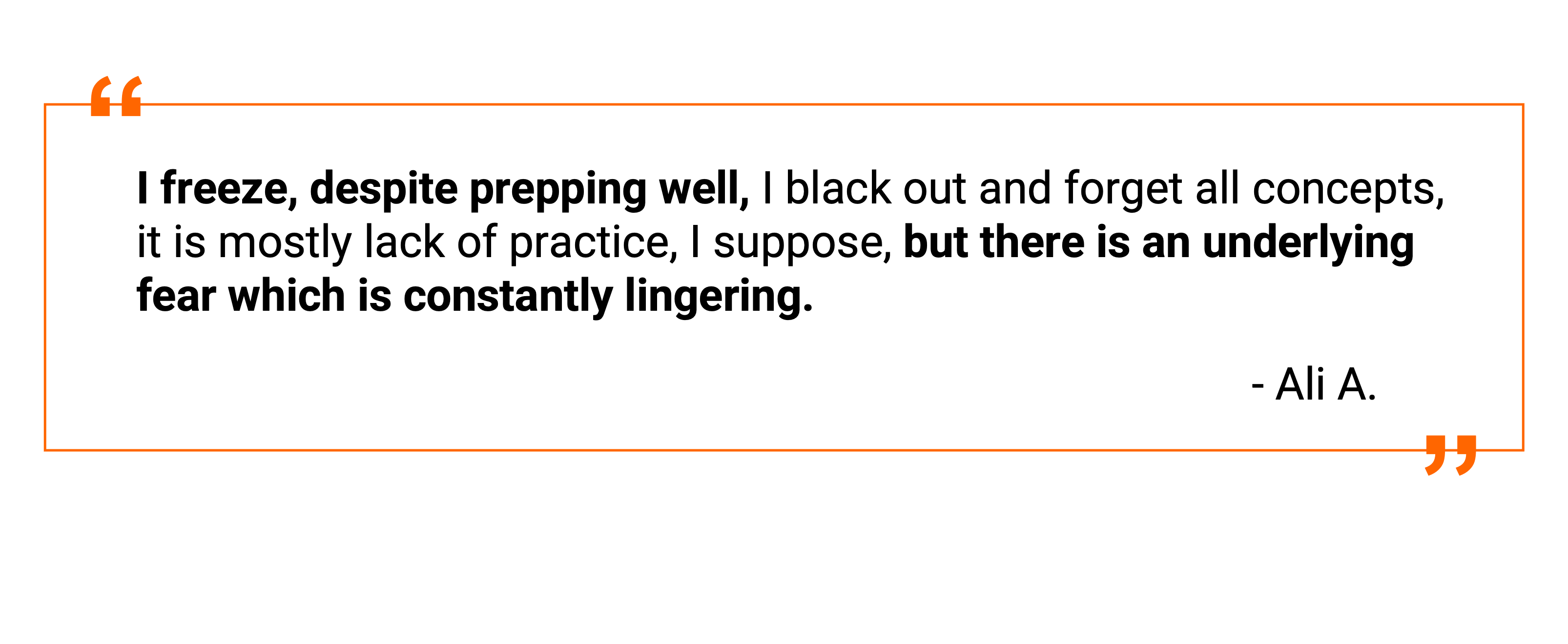
Being good at structuring means you can break down and create a plan to solve any type of problem.
This means no more "blanking out" or "getting stuck" in any case, or even throughout the case. Yes, even in "atypical" problems.
WAY #2: Risk reduction (or even elimination)
I once heard one candidate say that they feel like he was always "one bad structure" away from being rejected.
He was anxious. And I could've sugar coated it.
But you know what? It's true.
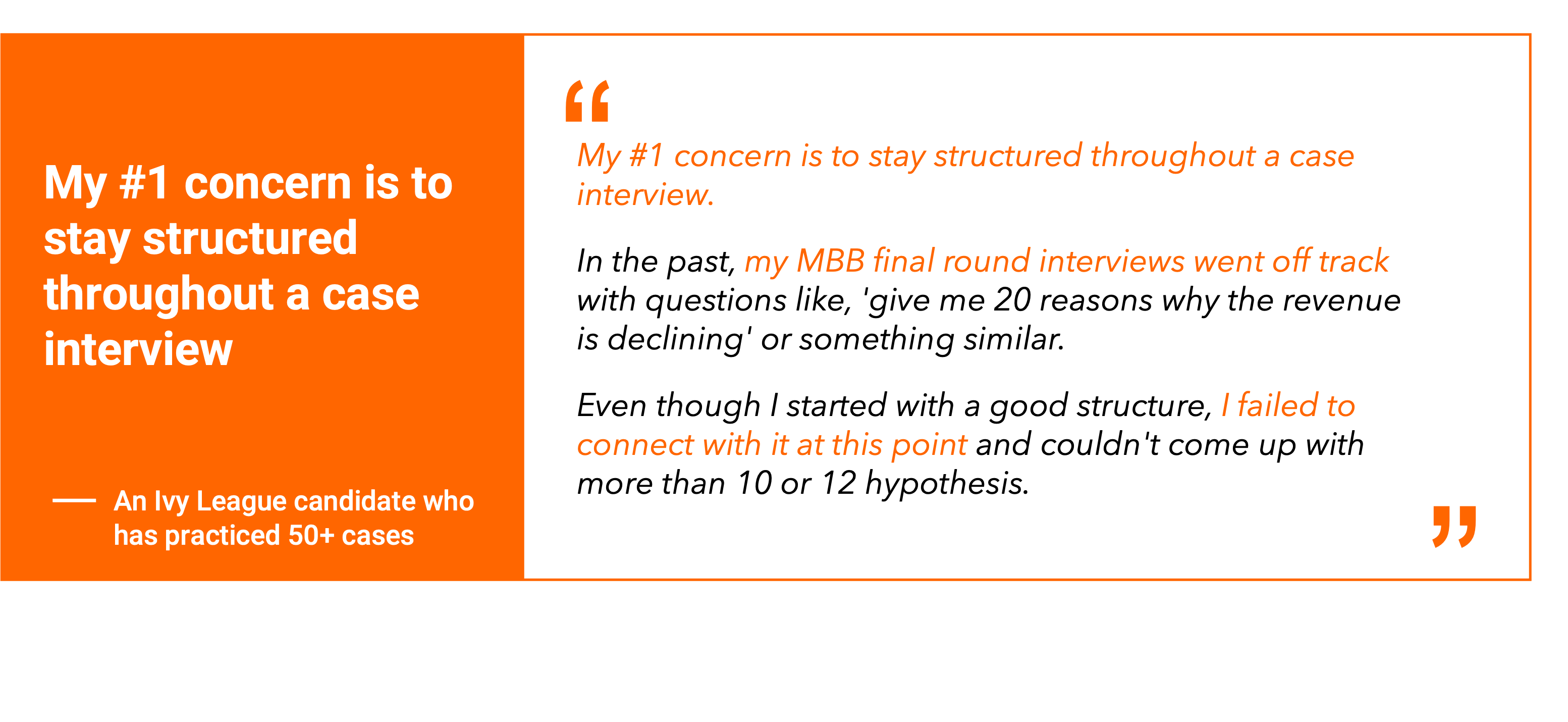
If you're actually good at structuring, however, you'll NEVER run this risk.
Real consultants aren't afraid of not being able to tackle a new client's problem, because they KNOW they can. And so should you.
WAY #3: No more overwhelm
Cases (and real projects) often feel like drinking from a firehose.
Too much data. Too many nuances. Too much information in very little time.
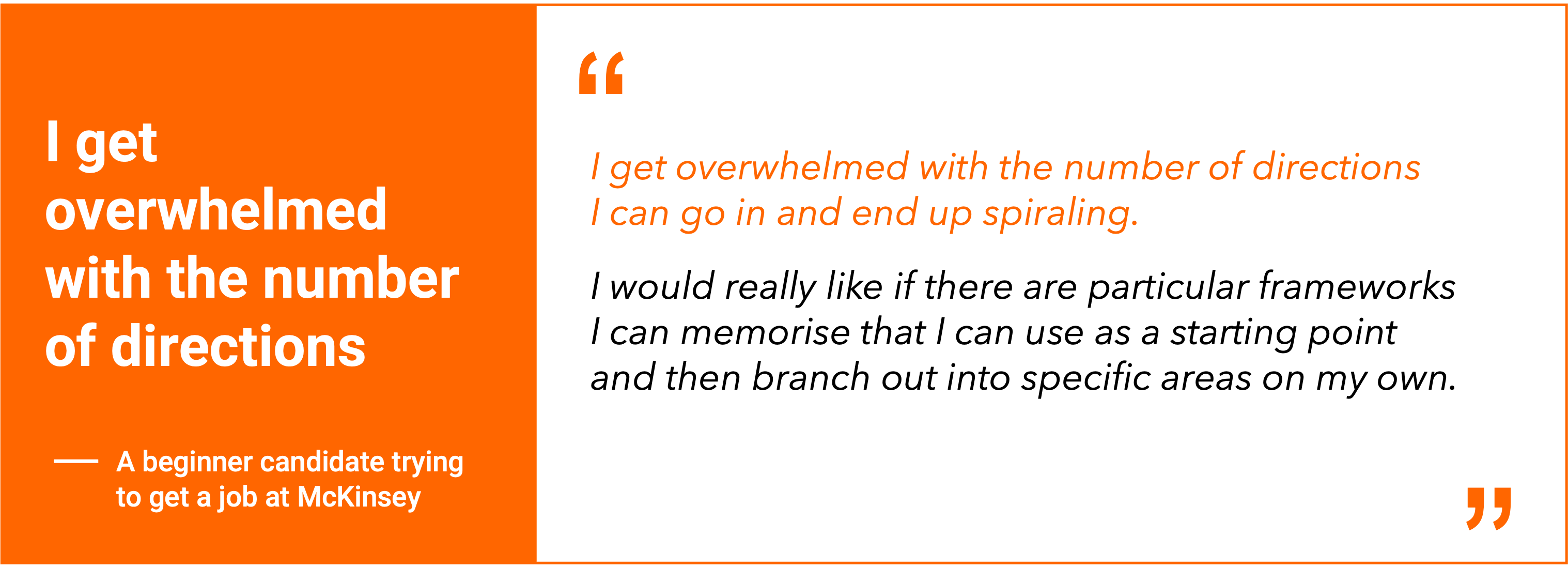
I too would love if there were some frameworks you could memorize that'd get the work done -- it would certainly make my life teaching this a whole lot easier!
A good structure gives you, well, structure to put all the pieces in the right place and to know which pieces of data are essential and which are minutiae.
When you suck at structuring, your cases often devolve into a spiral of chaos.
But when you master structured thinking, they're always ordered and under control, no matter how much stuff is thrown at you.
WAY #4: A great first impression
Structuring is almost always the first thing you do in a case.
When you're bad at structuring, you leave your interviewer anxious.
They feel like they're wasting their time.
Have you ever heard that interviewers make up their mind about a candidate in under 5 minutes?
Well, there's truth to it.
But guess what you're doing in the first 5 minutes of a case? That's right! You're structuring the damn case.
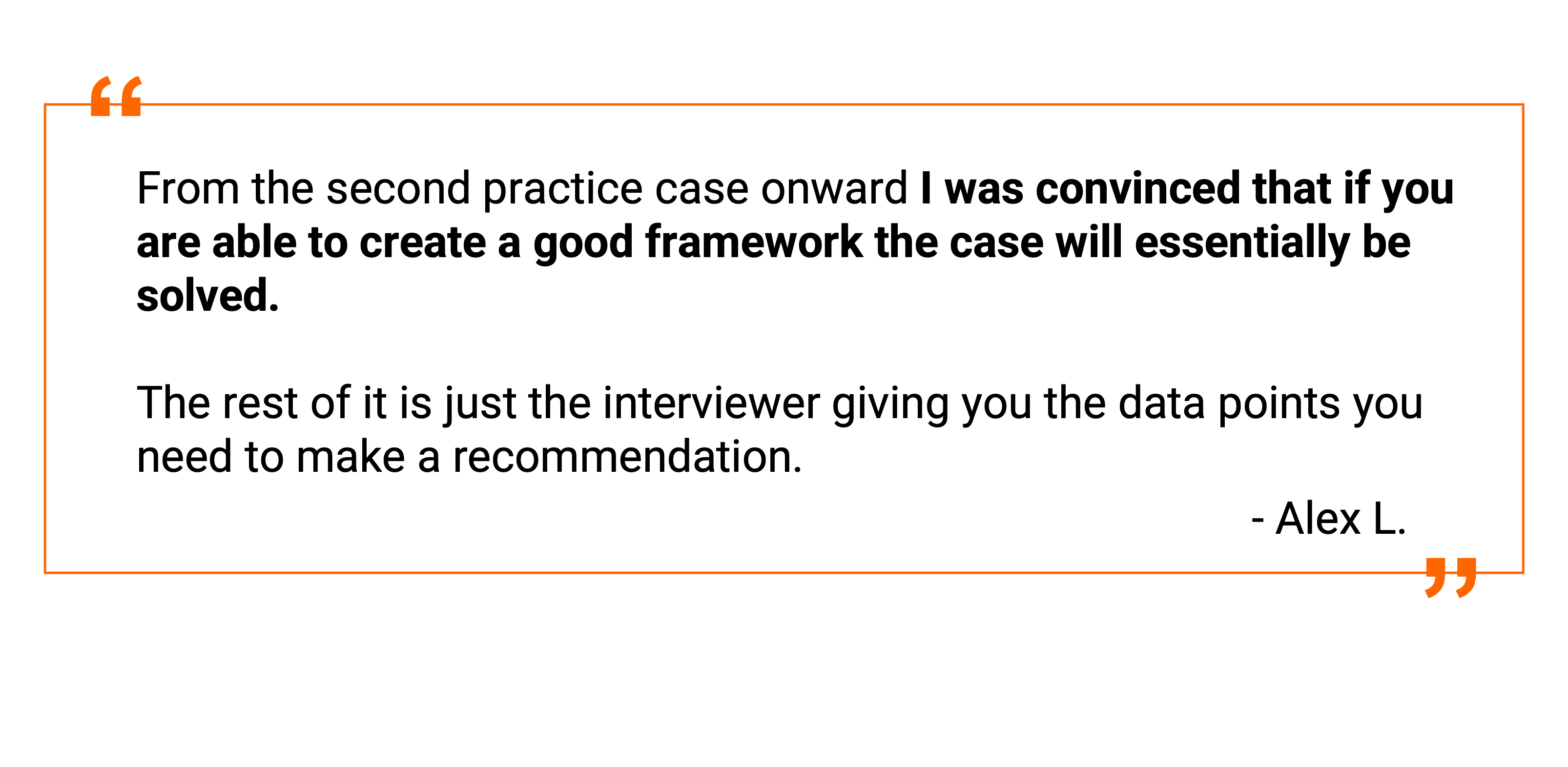 Yes, humans do have a bias towards keeping first impressions, but that's not what's magical about the first 5 minutes.
Yes, humans do have a bias towards keeping first impressions, but that's not what's magical about the first 5 minutes.
What makes these first 5 minutes so telling is that they know from experience that candidates who structure well can also solve the case well.
Start the case with an A+ structure and the case basically solves itself.
WAY #5: You'll solve your cases faster
Great structures aren't just MECE, they're also to-the-point.
They cut through all the bullshit and go straight to the crux of the matter.
So, no wonder you're spending 40 minutes "gathering information" and still haven't gotten to the end of the case.
YOU'RE ANALYZING 8 BUCKETS WITH 5 ISSUES EACH.
Sure you're exhaustive, but who has the time for that?
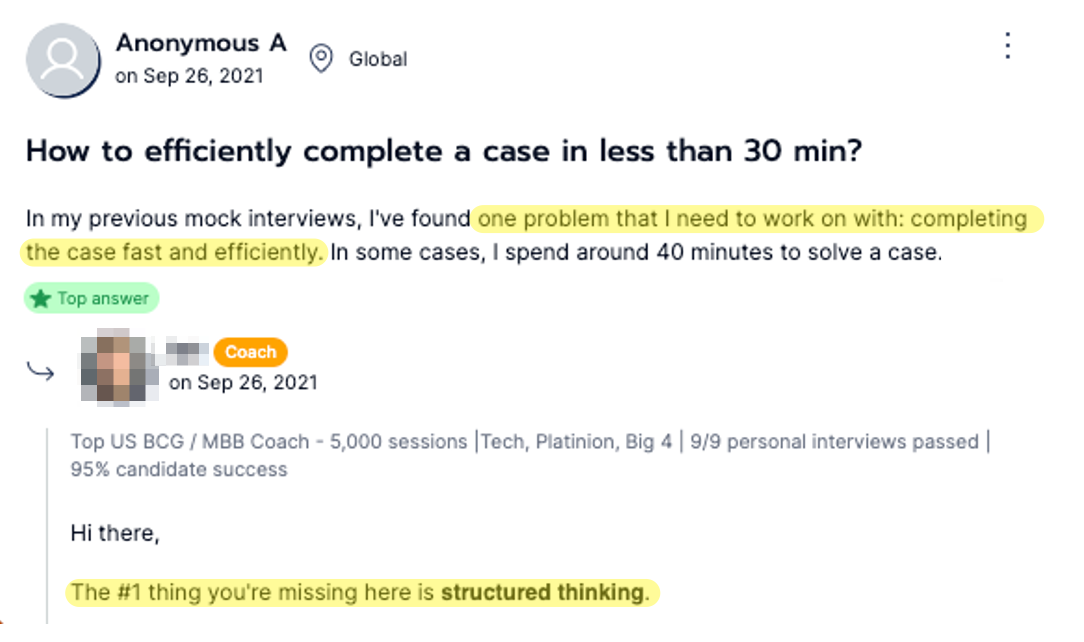
Every MBB coach knows that the key to speed is to learn structured thinking
A great structure puts the ONE KEY QUESTION of the case front and center.
You can solve that in 5-10 minutes while all other candidates are still talking about Issue #4 from Bucket #6.
Then the interviewer might give you a piece of math "just to check" or sell the firm to you (because they know you'll get other offers).
WAY #6: You'll break through your prep plateaus
Most candidates reach a "plateau" during their prep.
This is normal and expected, and it usually happens around their 30th mock-interview.
The problem is: you have to "break through" this performance plateau.
In 99% of situations, you'll plateau before you're ready.
But there is good news too...
I've coached HUNDREDS of candidates, and almost all plateaus have ONE ROOT CAUSE:
Poor structuring skills.
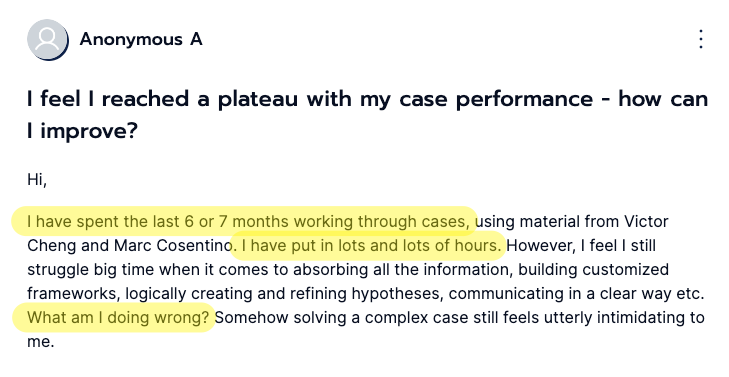
DUDE, 6 MONTHS?? What's that saying about madness again? About doing the same thing over and over again and expecting different results?
The symptoms are different.
For some it manifests as poor communication skills.
For others, they don't know how to drive the case forward.
Some people never reach a recommendation (or just can't say it confidently). Others get too little information to conclude anything, or do too much math.
Well, all of these problems are downstream of structuring.
I can't say structuring is the cure-all, but it kinda is.
Mastering structuring solves the problems of almost all candidates who are stuck and simply can't seem to improve.
Yes, structuring IS a learnable skill
Believe it or not, back when I was preparing, I always felt like "maybe I just wasn't born with what it takes".
As you might already know, the first time I applied, I got multiple rejections (from 10+ firms, including MBB).
I felt like shit for a while, and then decided to reapply -- but to do it RIGHT this time around.
But I had one problem...
I had multiple rejections already.
I clearly wasn't a "natural", and traditional case prep wasn't working for me.
So I ditched the books and frameworks and decided to actually learn how consultants truly structure their problems.
From scratch, with no "case book frameworks".
It was a long process (too long to tell you today), but I basically had to reverse engineer how they talked and look for the hidden patterns.
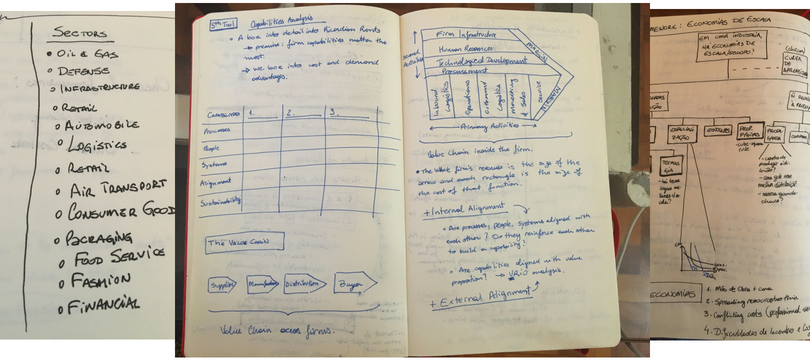
Notes from the fabled "Red Moleskine" that I used to prep and get offers from McK and Bain after being rejected from 10+ firms the previous year. I later gave this notebook to a friend (who used it to get offers from Bain and BCG). He then gave it to Julio, who used to get into Bain and later became my partner at Crafting Cases.
But I learned it.
Well, I learned it well enough to have McKinsey and Bain partners calling me multiple times to ask me to drop their competitor's offer and go work with them.
And you can learn it too.
No one's born with the skill of structuring problems. And no school (not even top-tier MBAs) teaches this.
(Which is why this skill is so rare and coveted by companies, by the way.)
And this gets me to the crux of the problem:
Why do most candidates never learn structuring?
The answer is simple:
Very few people can teach it, and those who can have no incentive to do so.
Most people who have this skill are in high-paying jobs and with meteoric careers.
And then you have a few people in the case prep industry. Yes, the 5 or 10 people you've seen around who create prep materials for you.
Well, the dirty little secret of our business is that the money is in serving the very beginners and selling to universities.
The very beginners want frameworks to memorize. They want magic pills. I was this way back then, and you probably were too at some point.
(We all stop when we realize it doesn't work, but for most, it's too late.)
Universities, on the other hand, mean well, but they're mostly interested in buying lectures and workshops.
(You know those "Learn cases in 2 hours" workshops? Yeah, those.)
So it's easier (and more profitable) for everyone involved to give you a bunch of frameworks to "copy and paste" and maybe teach you a few isolated techniques.
But to actually learn structuring, you need a SYSTEM.
You need a system to identify the underlying logic (or structure) of the problem.
You need methods AND techniques to be able to create customized structures for each problem.
And you need a TON of in-depth exercises to see the system, methods and techniques in action and practice them yourself.
Back when Julio and I started Crafting Cases (in 2016), we saw this "gap" in the market and decided we wouldn't do like everyone else and cater to the lowest common denominator.
We would create the prep materials we wish we had back when we were preparing.
The prep materials that would help people who don't want to sound rehearsed like everyone else, but who want to learn to think and speak like consultants do.
For years, we had a program called Structuring Drills. It was a program to learn structuring through practice.
And people LOVED it. We had THOUSANDS of customers in it and 96% of our reviews were 5-star reviews.
But we had never actually shared the whole system. We saved that for a few coaching clients.
But now, we'll make it all available to you. And we held nothing back...
Introducing... The only practice-based program that teaches you the systems, the methods and the techniques to structure ANY case problem like a real MBB consultant would.
The only practice-based program that teaches you the systems, the methods and the techniques to structure ANY case problem like a real MBB consultant would.
Here are just a few of the things you'll learn in
Structure from Scratch:
-
Why your memorized frameworks will betray you in the most common type of MBB case (and the systematic "algorithm" that works instead).
-
How to identify which of the 4 Types of Cases you're facing in 15 seconds or less, so you take ZERO risk and waste no time building the wrong framework.
-
The weird reason why most candidates waste 10+ minutes gathering useless context in their cases (and how you can cut straight to the answer in under 3 minutes using Objective-driven Structures).
-
The "Intersection Method" that transforms a confusing 13-question framework into a laser-focused structure with just the 3 key questions your interviewer actually cares about.
-
The systematic 3-step process real consultants use to solve any Diagnosis case -- from profitability problems to operational issues -- without ever "boiling the ocean".
-
How your interviewer spots whether you're using pre-made frameworks or not (they can tell in under 90 seconds, and it's not what you think).
-
The one structuring mistake that makes even experienced candidates look like "wannabe consultants" (Hint: it has nothing to do with being MECE).
-
The "Interweaving Technique" that adds a "north star" to your frameworks -- giving you perfect direction through the whole case even in complex cases with multiple areas to analyze.
-
Why strong candidates still create "Frankenstein Structures" even after learning MECE... (And how to stop making this mistake yourself.)
-
How to use the "Cheap Test" method to eliminate bad options from your structures in 30 seconds each -- saving you 10-15 minutes per interview.
How Structure from Scratch works
Imagine if you could sit next to a couple of MBB consultants and learn to structure different case questions until you've internalized the nuances of how management consultants structure their problems and could do it yourself.
Of course, Julio and I can't sit and personally guide each person who wants to improve their structuring.
But we've created something BETTER than that.
See, our coaching packages start at $500/session, with a minimum of 10 sessions...
...So even with our coaching clients, we don't have the time to carefully explain the logic behind structures. It's straight to practice and feedback.
In this program, we have time. We have breathing room to carefully explain the logic behind structuring, and the different types of cases and structures.
We have the time to teach you every structuring technique we know of (many of which we developed ourselves), and show you tons of examples and counter-examples.
Above all, we have the time to practice. A LOT.
In Structure from Scratch, we show you our whole system to structure cases quickly, intuitively and in a customized way.
And you get to practice with us at your own pace, as your schedule allows.
(In fact, being able to do a ton of practice on your own, without paying a coach or having to schedule with other candidates is one of the key reasons people join this program.)
We've created this program so that it's the equivalent of getting 30-40 hours of coaching with us.
And we've made sure it's as close as it gets to getting personalized guidance from us.
Learn the 4 Types of Cases and the "Algorithm" to structure each one of them

Everyone learns that you structure cases based on "case type":
- "Use this framework to ace your Market Entry cases"
- "This is the proven way to structure M&A cases"
- "Never forget doing this in your profitability cases"
The problem?
This never works. You're almost sure to get a public sector case, or a weird business case you've never seen before (like a "white-labeling" case), or even a combination of two common case types.
In this course, we'll prove to you that this approach is dangerous, and we'll offer you a different approach.
An approach that, instead of focusing on the "type of decision", focuses on the underlying structure of the problem itself.
We call this "The 4 Types of Cases", and each of these types of problems has different underlying logics -- and different ways to structure them.
Two "Market Entry" cases, for instance, can be of different types.
One may be an "Analytical Decision", while the other may be a "Strategic Decision", for example.
And if so, their structures will follow a completely different logic, approach, and prioritization.
In this course, we'll show you how to identify each type of case, we'll show you the "Algorithm" to structure each, and we'll teach you the techniques you'll use to structure each one of them.
The goal here is that you'll stop memorizing frameworks and reciting them blindly to your interviewer.
Instead, you'll show them you can think about the logic of the problem in the same way they do.
Learn the beginner and advanced techniques real consultants use to structure their clients' problems

To structure well, you need to go beyond the tactics and the techniques.
You need to understand the different underlying structures problems have and the system to structure each...
...But you do indeed need to learn the techniques.
We've PACKED this course with structuring techniques.
You'll learn, in-depth, the key structuring techniques, like "The 5 Ways to be MECE", "MECE Issue Trees" and "Bucket Frameworks".
(These are the ones you should master so you even have a chance to get the offer.)
But you'll also learn advanced techniques, including:
-
The Interweaving Technique: An easy-to-learn, fast way to make your "Bucket Frameworks" (or Conceptual Structures) 2X sharper and more to the point (this is the easiest way to differentiate yourself in strategy cases).
-
Objective-driven Frameworks: We'll show you how to structure complex cases like real consultants do -- not through "buckets" to gather information, but through "Key Questions", or "Key Hypotheses". This technique alone allows you to solve complex MBB cases 2X faster, because you cut all the BS from your frameworks.
-
Option Trees: A special type of Issue Tree that's rarely used by candidates, but often used in projects and that's useful for structuring cases that should be framed through an "Answer First" approach (we'll show you how to identify that as well). Option Trees are especially useful for Revenue Growth cases, Competitive Response cases and Corporate Strategy cases.
Besides these three advanced techniques (that no one else teaches), we'll also teach you:
-
Advanced Brainstorming techniques (like the "Pivoting Technique" to brainstorm hundreds of ideas at the speed of speech).
-
The best tactics to do Hypothesis Testing effectively (The "Cheap Test" Method is just one of them).
- Niche structuring techniques that are useful for final-round cases ("If-then Frameworks" is one of them, very useful for ambiguous problems that must be solved in a short amount of time).
Practice 50+ drills to actually improve your structuring skills (and vastly improve your Business Sense at the same time)
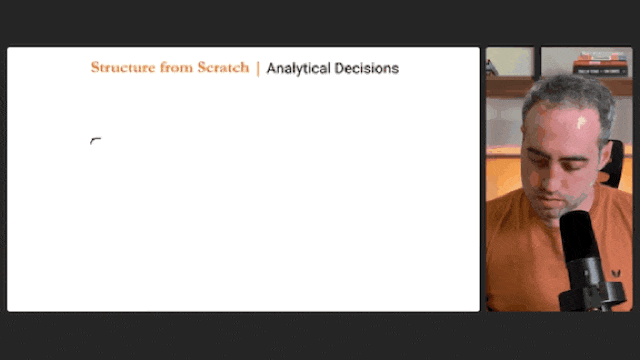 You'll watch me creating structures IN REAL TIME, just after you've built yours
You'll watch me creating structures IN REAL TIME, just after you've built yours
We've embedded tons of high-quality video practice drills in this course, as we do in all our courses.
We could teach you all the theory you want in this course, but would this actually improve your performance when interview day comes?
I wish, but probably not.
Solving cases is not something you learn from a textbook. It's a skill you need to hone through practice.
We've added 50 Framework drills in this course, covering each of the 4 Types of Cases and every single technique we teach.
These Framework drills are in video format and all follow the best structure we've found for solo practice:
-
You'll get a case question, pause, and try to structure the case following the specific system and techniques you've learned in that module.
-
Then, you'll watch us structure the case as we would in a real interview (including the communication style).
- Finally, you'll watch us debrief that structure and comment on best practices and common mistakes. (Here's where you'll improve your business sense.)
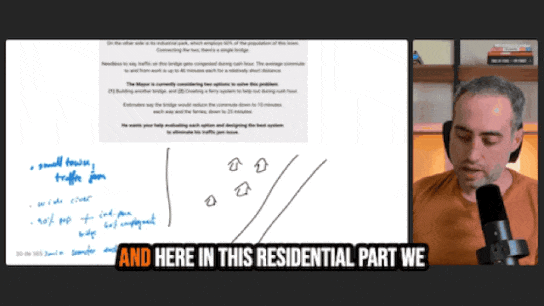 Practicing is good. But being debriefed in detail after each practice session is what leads to true greatness.
Practicing is good. But being debriefed in detail after each practice session is what leads to true greatness.
These drills cover countless industries and public sector problems and cover all types of decisions (or "case types", as commonly known) you can think of, including:
Profitability, Market Entry, Market Exit, Revenue Growth, Private Equity, M&A, Pricing, Turnaround, Competitive Response, Operations, Capacity Expansion, Infrastructure, Franchising, White-labeling, Verticalization, etc., etc., etc.
(And yes, we have multiple Public Sector drills, including Education, Public Health, Sanitation, City Transit... You get the idea!)
But that's not all...
You'll also get dozens of drills specifically for Brainstorming and Hypothesis Testing.
These are incredibly important types of structuring questions that candidates (and casebooks) give little attention to.
A big mistake!
In fact, while each case has at most one Framework question, most cases have anywhere from 2-4 Brainstorming questions and another 2-4 Hypothesis Testing questions.
You won't find these questions in casebooks because they're often informally asked by your interviewer.
They don't seem like "official" questions, but you ARE being evaluated.
While the Framework question gets all the attention (since it's usually the first question of the case), a large part of your structuring evaluation happens in these two other question types that no one talks about and no one practices for.
Master Brainstorming and Hypothesis Testing
So, let's talk about these types of questions.
About 80% of this course's content focuses on building Frameworks, or initial structures for your cases.
That's because Frameworks are harder to build (since their purpose is to structure more complex questions), and arguably more important too (they set the stage for the case -- and your interviewer's initial impression of you).
However, you can't say you can structure any problem from scratch if you haven't mastered Brainstorming and Hypothesis Testing questions.
In this course, we'll show you the basics of structuring Brainstorming and Hypothesis Testing, PLUS we'll show you advanced techniques for them.
But most importantly, you'll master them through a lot of practice.
While Frameworks are more complex and really do need a complete system to be mastered, the best way to master these other two types of structuring questions is through practice.
High-quality practice, and with enough volume.
Which is what you'll find in this program.
Frequently Asked Questions
Is this course for me?
-
Who is this course for?
This course is designed to take you from complete beginner to a top 1% in structuring skills among MBB candidates.
For beginners: it makes sense to master structuring from the beginning of your case prep journey because it is the main bottleneck for those starting out.
Structuring is the most important skill for succeeding in your cases and it's also the one most candidates struggle the most with.
Giving yourself a head start and an edge in structuring will make everything else about consulting interviews easier and smoother.
For more advanced candidates: Chances are you've hit a plateau in your case performance.
At first, you learned a lot, but after doing 20 or 30 cases it seems like you're not improving much (even though you keep practicing).
This is common, but not natural.
And for most people it's due to your structuring skills being stunted.
You already know how to solve cases. You're just not that good at it yet. Or at least, not consistent enough.
If you learn to structure well, your case starts will be sharper. You won't ever get "stuck" anymore. You'll be able to quickly find the "crux of the case".
You'll have better insights, your communication will be more structured, clear and concise. Even your math will improve (because you'll finally know why you're doing each piece of math.
If you've done enough cases, deep in your heart you know that if your structures were better, if your structures were GREAT, you'd be able to ace any case. -
How is this different from your free course?
In our free course, Case Interview Fundamentals, we give a very brief introduction to structuring, but we don't have the time to teach you all the skills you need to excel.
As we say in the course itself, we give you just enough so that you're able to create a structure for any case you get.
(Sadly, this is better than 90% of paid courses out there...)
In this course, we give you a COMPLETE SYSTEM to build the optimal structure to any case. Not just a structure, but the best structure.
Structure from Scratch will teach you to highly impress you interviewers in the first 5 minutes of the case, and keep being structured at an MBB-level throughout the case.
It puts you in the top 1%.
You'll also learn how to go straight to the crux of the case. To the few things that actually matter. This often makes you solve your cases 2X faster, while being more insightful.
This course has 10-15X more structuring techniques and practice than our free course, and a cohesive system to use all of these techniques with zero overwhelm. In a way, it's a blueprint of how consultants think.
If the free course has helped you (as it has helped many people), great. But if you want the real deal, you'll find it here. -
How is this different from Control the Case? And Structuring Drills?
This is our only course focused on learning to structure like a real MBB consultant on your own time.
Our other paid courses touch on other aspects of case interviews (quantitative analysis, estimations, mental math, etc.)
One of our courses, Control the Case, also touches on structuring, but only indirectly. In that course you'll learn the dynamic of solving full cases and interweaving all the skills together into the dance of the case interview.
You'll see some cool structures in Control the Case, but you won't learn how to build them. If you want to learn how to actually BUILD structures, the course you're looking for is Structure from Scratch.
Btw, in the past we used to have another structuring course called Structuring Drills.
It was a course focused only on practice. Basically extra practice drills to practice the skills taught in our free course on your own.
It was a great program. Our students loved it (4.9 stars, with almost 100 reviews) and many of them recommended to friends.
Still, we've decided to create Structure from Scratch (despite Structuring Drills being our best-seller) because we wanted to create the best training program on structuring ever created.
It's subjective, but I'd say this course is 5-10X better than Structuring Drills. Way deeper, a better system, more techniques and even more practice. -
Can't I just practice from casebooks?
I mean, you could. But you won't learn anything.
LOL.
Okay, seriously now. The guys who make casebooks are well-meaning, but they're basically MBA students putting down to paper the cases they had last year when they were applying.
They put some sample answers in there to give you some direction, but I've seen those and most are downright bad.
They basically apply frameworks to what they think the case is about. We know memorizing frameworks don't work, so those won't work either.
I usually say practicing from casebooks is an OK alternative if you don't have any money (you can check that in our other product pages), but this time I'm gonna say that practicing from casebooks can actually damage you.
You can't learn from bad models, because you start thinking bad answers are good answers.
Also, casebooks are not made to make you learn -- they just give you practice examples. They don't teach you the techniques. They have no system, no progression.
They're the wrong tool for the right job. -
How is this different from what I will find in other platforms?
There are many case prep platforms out there, some of which you may know or even have access to.
I won't comment on them individually (it would be crass coming from me), but in general they're focused on getting beginners started.
(And I think even my competitors would agree with that.)
So, let me be precise:
70-80% of the content in this course is content you won't find anywhere else.
Not in our free materials. Not in our competitors' materials.
We had to create this system from scratch because there was no system anywhere that taught the skill of structuring problems.
Even consulting firms don't teach this. They just assume you'll learn by osmosis (which does happen for most people after a couple years in these firms).
We obviously didn't just "make stuff up". We reverse engineered how consultants structure problems and turned it into a system with progression and several learnable, logical techniques.
Another thing you won't find elsewhere is the PRACTICE.
Most platforms offer structuring drills nowadays, but they're text-based with shallow sample answers. Much like a casebook (with slight better branding).
All our 50+ practice drills are in video.
You'll see me structuring in real time, delivering the structure as I would in an interview, and then debriefing it with you using the systems and techniques of the course as references to explain them. The difference is night and day. -
How much time do I need to go through this program?
Between 3 and 6 weeks, depending on your pace.
If you have less time than that, you can get about 80% of the skill improvement in about two weeks if you dedicate a couple hours per day on it (and watch some videos in 2X speed).
If you're very crunched for time, you'll have to make a choice.
Is improving your structuring the most important thing in your prep right now?
If so, NOTHING will make your structuring skills improve faster (with the possible exception of hiring a coach for 2-3 hours per day).
So, even if you only have the time to do, say, 50% of this course before your interviews, isn't it worth to take the shot? Maybe, you'll have to evaluate for yourself.
Perhaps the more important thing is to try to not put yourself in this situation. Our students with the most success are those who join early, rather than later. -
Does this course substitute case practice / mock interviews?
Not all of it, but a good chunk.
Mock interviews serve many purposes. The most essential one, that cannot be substituted is learning to control the dynamic and information flow of the case.
But people do mock interviews for other reasons as well.
They do them to improve their structuring. To get exposure to many different industries and improve their business sense. To see if they can structure and solve unusual cases.
You can learn the dynamic of a case interview in about 20-30 mock interviews. So, why do people do many more?
Because of those other factors.
This course will severely reduce the need for doing that many mock interviews. You'll improve your structuring and business sense more by doing this course than you would doing 50 mock interviews.
So you'll still need to do some mocks, but just a few every now and then. -
Can I expect to get an offer at McKinsey/BCG/Bain just by doing this course?
Of course not.
Not by just doing this course.
Obviously I can't promise an offer to ANYONE, regardless of what you'll do.
What I can say is that you will NOT get offers at top firms until you master structuring.
What I can ALSO say is that if you work through this course diligently, you WILL structure better than 95% of candidates.
(I'd estimate 99%, but I don't know you personally, so I can promise 95%.)
I can also say with confidence that if you learn everything that's in this course you will NEVER find a case (or problem) that you don't know how to structure well. One that gets you "stuck" or that makes your mind "go blank".
Another thing I can say with certainty is that structuring is the most important skill to have a good case performance, and thus get an MBB offer.
And finally, I can say that you won't find a better resource than this program to improve your structuring skills.
You'll structure better than most candidates who've spent $5,000+ on private coaching (and I know this because I've worked with such candidates).
But I can't promise you an offer. Each interviewing process is individual. -
I have an interview at another firm, will this course work?
This course is designed to put you in the top 1% of candidates who apply to McKinsey, BCG or Bain in terms of case structuring skills.
Other firms have a lower bar, so you'll be outstanding in their eyes. Perhaps top 0.1%.
Is this course an overkill if you're applying to other consulting firms? Maybe.
But another way to look at it is that you'll be their star candidate and your chances of getting an offer with them go through the roof.
These firms, while not as "prestigious" as MBB, are often excellent firms, with a high-paying, high-growth, and extremely interesting career.
And, perhaps less urgently, but certainly as important, you'll learn structuring skills that you can take with you for your whole career.
The skills you'll learn in Structure from Scratch are not just for passing interviews. They're also incredibly useful for any business career (or government career, for that matter).
They're also timeless skills.
It may sound cheesy, but my children are gonna be required to take this course when they turn 16 😂.
(Seriously.)
Try Structure from Scratch for 30 days, 100% risk-free!

We've worked hard to make sure this is BY FAR the program for beginners and advanced candidates to learn the skill of structuring problems available anywhere.
The methods and insights you'll find in this course are the result of 10,000+ hours helping candidates and almost 10 years of experience with case prep.
You'll get more from this program than you will from most coaching programs. You'll certainly improve your structuring skills more than you will from doing 50+ mock interviews with other candidates.
We know it works, and we know it will help you master the art and craft of structuring.
And we want you to see it by yourself - which is why we offer you to try the whole course risk-free for 30 days.
If after 30 days you don't LOVE this course, we want you to have 100% of your money back.
Just send us an e-mail, show us you did the work and we will return you 100% of the investment of the course. We'll even eat the credit card fees.
This guarantee lasts for 30 days, which is more than enough to go through the whole course.
One last thing...
There's a reason why consulting firms are so OBSESSED with candidates who can structure problems well.
It makes them effective at their jobs.
And have you ever wondered why ex-consultants get so many good exit opportunities, rising through the ranks of all kinds of businesses?
It is because the skills they have make them effective as executives as well.
Being a structured thinker makes you excel at decision-making, managing people, prioritization, presenting at meetings...
Honestly, it makes you excel in all hard and soft skills an executive career requires.
It gives you an edge in all professional skills you already have AND any roles you might take in the future.
When we created this program, we've made sure it's not just a program to help you pass your interviews.
We've made sure the structuring skills you'll learn here will be useful on the job.
And not just in consulting. In any job.
Show me two young professionals -- both went to the same school, both equally smart and hard-working, and both with the same ambitions...
...But one has learned structured problem-solving and the other has not.
What do you think will happen to them one year from now?
Ten years from now?
TWENTY years from now?
I know which person I would place my bets on.
I'm saying this because so often we're concerned about the near future, about the next step.
And this is fair!
You're doing your best to have the best chances in your interviews.
And if that's your reason, that's fine too. If a real consultant were preparing for their interviews, I know they'd focus 80% of their time, effort, and resources on improving their structuring.
It is the key skill, after all.
It's the first step in problem-solving, it's the most impactful ability in your case performance, AND it is the rarest to find in candidates.
But it goes so much further than that.
It is also one of the most impactful skills one can have in their career AND one of the rarest skills to find in professionals, even high-level executives.
And one of the reasons for this is that no one teaches this.
School, company trainings and, yes, other case prep experts -- they all teach you structures, not structuring.
They show you some frameworks you can use (maybe, someday, if it makes sense).
But NO ONE teaches you structured thinking. How to create your own customized structures from scratch.
How to dissect a problem into its unique parts and go straight to the crux of the matter.
But today we're offering that.
We're offering you a system, with the techniques and practice you need to learn this skill at the highest level.
This is a skill that will make you extremely competitive for the most coveted jobs on earth.
And it is also a skill that will propel your career, no matter where you choose to work (or what you choose to work with) 5 or 10 years from now.
So, I have to ask you...
Will you take the plunge and finally learn to structure problems from scratch?
